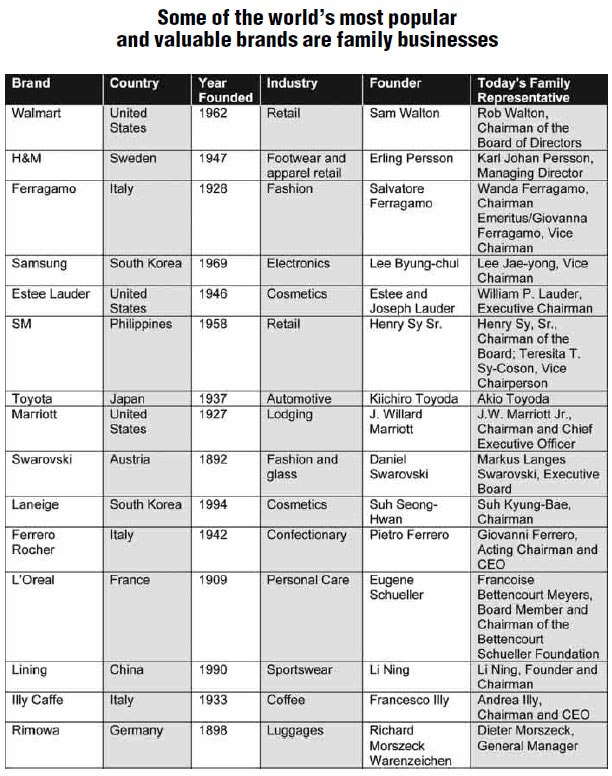Values determine fate of family-run businesses
MANILA, Philippines–The Family Firm Institute (FFI), founded in 1986 and based in the United States, estimates that 70-95 percent of businesses in every country are run by families.
These family businesses contribute 70-90 percent of the world’s gross domestic product.
There are several definitions of family businesses.
According to one, “family firms are those in which multiple members of the same family are involved as major owners or managers, either contemporaneously or over time” (Miller, Le-Breton Miller, Lester, Canella, “Are Family Firms Really Superior Performers,” Journal of Corporate Finance, Vol. 13, Issue 5, 2007).
Also, “listed companies meet the definition of family enterprise if the person who established or acquired the firm (share capital) or their families or descendants possess 25 percent of the decision-making rights mandated by their share of capital (European Union definition 2009).
5 attributes
Based on a third definition, family firms “are those in which the family controls the business through involvement in ownership and management positions. Family involvement in ownership (FIO) and family involvement in management (FIM) is measured as the percentage of equity held by family members, and the percentage of a firm’s managers who are also family members (Sciascia and Mazzola, Family Business Review, Vol. 21, Issue 4, 2008).”
Successful brands that are family owned share the same characteristics.
Long-term vision and family cohesiveness drive successful family businesses.
Successful family brands think long-term across multiple generations. This means that any family member’s personal agenda and biases must be set aside for the good and sustainability of the company and the brand.
Focus. Owners of successful family brands understand their role and priorities. They do not aim to be a jack-of-all-trades.
Competent assistance must be sought where there is a lapse in expertise, management or function. They may be expert consultants in areas like brand management, human resources, production, etc.
Owners should remain focused on strengthening the business, building sales volume and managing profitability. Work-related distractions, family politics and irrelevant micro-management are avoided to ensure the achievement of business objectives.
Know one’s role. Successful brand owners know that the company’s vision, legacy and strategic direction are their primary responsibility.
Brand building and management. The key to success of many multigenerational firms is the sustained life of company brands. Owners of successful family brands realize that brands fuel business growth. Thus, the right investments in building and maintaining brands must be sustained.
Innovation is far quicker in a progressive thinking family business compared to publicly traded corporations.
A family member who understands the legacy of the brand and family is also the brand’s caretaker. Along with the brand name, a successful family business shares its family values, culture and passion with the brand name.
Michele Ferrero, second generation owner of Ferrero SpA, famous today for Nutella, is also personally credited with introducing other world famous company brands like Mon Cheri, Kinder Chocolate, Tic Tac and Ferrero Rocher.
Michele’s passion for the business stretched into research and innovation, following the footsteps of his father, Pietro, who started making a hazelnut spread, called Nutella, as a substitute for cocoa during World War II.
Michele’s vision extended further to building a global brand.
Before Michele died on Valentine’s day in 2015, Ferrero SpA has become Europe’s second largest confectionary company.
Prudent management of working capital. Family owners of successful brands are often more efficient in managing their working capital. This is because funds are directly sourced from the owners’ pockets.
Fast facts on survival
The Conway Center for Family Business shares that the mean age of family control in the family’s core company is 60.2 years. More than 30 percent of family businesses survive into the second generation, 12 percent into the third generation and 3 percent live on to the fourth generation and beyond.
Nonetheless, the chances for survival are greater with progressiveness, passionate and positive involvement of family business owners.
(The writer is a 2003 Agora awardee for Marketing Education. She completed her Strategic Marketing Management course program at Stanford Graduate School of Business. She is chief brand strategist of MKS Marketing Consulting. E-mail her at www.karendeasis.com or karenvdeasis@gmail.com.)

